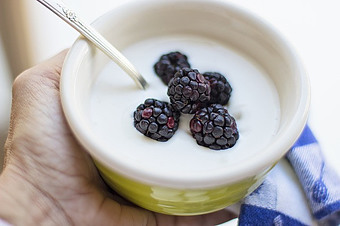Does yogurt have probiotics? The short answer is yes and no. Some yogurts contain probiotics, and some do not. It all depends on what cultures are used to make or add to that yogurt. Keep reading to learn more.
Live-organism Containing Products
First, let’s talk about what yogurts and probiotics are and what they have in common. According to Britannica, yogurt is a semifluid fermented milk food texture and mildly sour flavor. Yogurts are inoculated with certain bacteria strains for fermentation. These strains are typically Streptococcus Thermophilus and Lactobacilus bulgaricus. As for probiotics, the World Health Organization defined probiotics as “live microorganisms, which, when administered in adequate amounts, confer a health benefit on the host.” Do you start to see the differences in definitions? Hold onto that thought for now. We’ll talk about what they have in common first. Both yogurts and probiotics are considered live-organism containing products, which means that they both have live or active cultures that may or may not provide health benefits.
Now, let’s talk about how they are different. Remember that thought you had earlier about the difference in the definitions of yogurts and probiotics? If you thought that one has no mention of health benefits and the other does, you’re absolutely correct.

The Four Categories
Products that contain live microorganisms, such as yogurts and probiotics, are separated into four main categories by the International Scientific Association for Probiotics and Prebiotics (ISAPP). The purpose of this categorization is to define the appropriate level of regulation for each product clearly. Let’s go through each category.
First, the live or active cultures. These products are at the most basic level, where the manufacturers claim that their products contain live or active bacterial culture. These cultures do not have to be supported by any scientific evidence that they may provide health benefits. Because of this, the manufacturer cannot claim that the products have probiotic activity.
Second, the probiotics in food or supplement without a health claim. At this second level, we started talking about products that contain probiotics. The key word of this group is “without a health claim.” This may get confusing but bare with me. The requirement for products in this category is that they have to contain live or active bacterial cultures with sufficient evidence regarding their usage safety and public health benefits to users. Evidence of general health benefits is not the same as health claims. For example, a general health benefit would be “this product may help your overall health.” Where a health claim would look like this, “this product will improve the body’s immune system.” Do you see the difference? The first mentioned the general health benefit, whereas the second mentioned a specific health system. Please be aware that the definition of a health claim can vary between different jurisdictions. For example, the European Food Safety Authority (EFSA) requires more information on the characteristics of the bacterial strain before giving their stamp of approval.
Third, probiotics in food or supplement with a specific health claim. At this level, the requirement for approval is even more stringent. Usually, it involves a solid amount of convincing evidence that demonstrates benefits. As mentioned, the EFSA has additional requirements for products to be approved under this category.
Fourth, probiotics drugs. This is where probiotics are regarded as medication and are subjected to all the regulations that other medications have to go through. Once approved, the manufacturer can promote the products as the treatment or the prevention of certain diseases.

Yogurt’s Category
What category do you think yogurts belong in?
Let’s go back to my short answer in the introduction. We know from the previous section that products from category 2 and beyond are considered probiotics. But do all yogurts qualify to be in that category? I said yes and no. This is because some yogurts belong to category 1, and some are in the higher categories. So what determines that again?
If you’re thinking about health benefits, you would be right again. Only some bacterial strains have been shown to provide health benefits. If the yogurts were inoculated with those strains, they would be considered probiotics. You may also hear them referred to as probiotic yogurts. Vice versa, if the yogurts were inoculated with strains that have no health benefits evidence, they would be considered category 1 and not probiotics.
Other Products that Contain Live-organisms
Many other products aside from yogurts contain bacterial strains and can also potentially be considered probiotics. So what are those products? I suggest thinking of foods that you know are made through fermentation. I know what some of you are thinking, alcohol. Unfortunately, the fermentation method of alcohol is different from what we’re looking for in probiotics. Don’t worry, though. There are still a lot of healthy and delicious foods that count. Here are some of them: kefir, Kombucha, Sauerkraut, kimchi, and pickled vegetables. There are quite a few more floating out there. If you can think of any other ones, please share by leaving a comment below!

Conclusion
Hopefully, this article answers the question you were chasing after when you started reading the article. Ultimately, yogurts can be an excellent source of probiotics if they are inoculated with the appropriate bacterial strains. You can double-check the nutritional fact on the side to make sure it is actually probiotics. Thank you very much for reading this. As usual, if you have any questions, please feel free to leave a comment or reach out to me via email.

Reference
- Gupta, A., Saha, S., & Khanna, S. (2020). Therapies to modulate gut microbiota: Past, present, and future. World journal of gastroenterology, 26(8), 777–788. https://doi.org/10.3748/wjg.v26.i8.777
- Guarner, F., Sander, M., and co. (2017). Probiotics and prebiotics. World Gastroenterology Organisation Global Guidelines, 02/2017.
- Natural Medicines. (2022, March 22). Probiotics [Monograph] https://naturalmedicines.therapeuticresearch.com/databases/health-wellness/professional.aspx?productid=1598
- The United States Food, Drug, Administration. (2022, March 07). Label Claims for Conventional Foods and Dietary Supplements. The United States Food, Drug, Administration. https://www.fda.gov/food/food-labeling-nutrition/label-claims-conventional-foods-and-dietary-supplements.
- Nyanzi, R., Jooste, P. J., & Buys, E. M. (2021). Invited review: Probiotic yogurt quality criteria, regulatory framework, clinical evidence, and analytical aspects. Journal of dairy science, 104(1), 1–19. https://doi.org/10.3168/jds.2020-19116












PageJean
I am a BIG yogurt eater as well as my daughter.. I will only eat the Activia Yogurt or the Liberte Greek. Everyone has always told me that Activia is the best due to it high count of probiotics. I appreciate this post as it further explained to me how pro biotics work and where I may or may not find them. Great post, thank you!